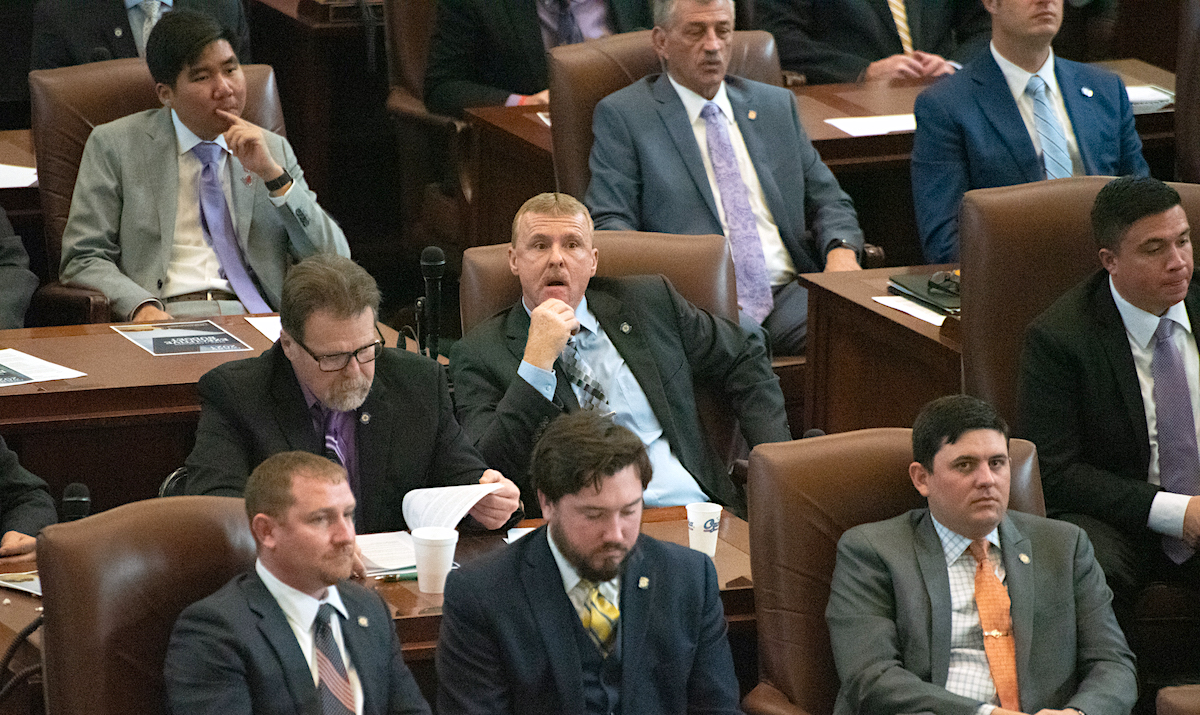When legislators puff-puff-passed HB 3208 in May, it set into motion a countdown to an Aug. 26 moratorium on new commercial licenses issued by the Oklahoma Medical Marijuana Authority. Now, as summer ebbs into fall and that deadline approaches quickly, the Oklahoma Medical Marijuana Authority is keeping an eye for a potential rush of last-minute applications.
The moratorium on new commercial licenses is slated to last nearly two years, ending Aug. 1, 2024. License applications received before the moratorium takes effect will still be processed. Patient licenses are not included in the moratorium.
Oklahoma’s cannabis industry has exploded since voters approved SQ 788 in 2018. There are currently 11,228 active commercial licenses (down from more than 12,000 in July 2021), according to the OMMA website. To put that number into perspective, California, with nearly 40 million residents, has about the same number of active commercial licenses, which include grow operations and retail businesses.
Oklahoma’s industry growth has featured criticisms and hiccups for the state entity charged with oversight, especially as law enforcement agencies and lawmakers contend that significant amounts of marijuana are entering the black market.
The OMMA has struggled to keep up with required annual inspections, prompting the Oklahoma Legislature to require the agency to hire additional inspectors in 2021. Meanwhile, some in rural communities have become upset over land, water and energy resources being consumed by commercial cultivation operations.
“There’s really only so much supply and capacity,” Oklahoma Farm Bureau public policy director Steve Thompson told NonDoc in June 2021. “These facilities have gone up around the state in huge numbers, and they’re on residential systems pulling industrial amounts of water and electric. The industrial loads on the grid can cause loss of service, and, in some cases, those city and county governments don’t really want to invest in upgrading because they don’t know if the bubble will burst at some point.”
OMMA public information officer Porsha Riley said the commercial license moratorium is aimed at allowing the agency to catch up with inspections.
“This past legislative session we saw a large number of medical marijuana-related bills pass, and we believe the intent behind those bills was to slow down the growth and cut down illegal activity and give the industry a chance to stabilize,” she said. “As far as the inspections, state law requires us to perform inspections up to twice a year. Previously, our compliance department was very understaffed, but with the increased number of compliance staff we have right now, we’re on track to inspect every business at least once by the end of this year.”
Applications and details about Oklahoma marijuana dispensary and grow licenses can be found on the OMMA website.
‘It’s grown way beyond anyone’s expectations in five years’

Rep. Rusty Cornwell (R-Vinita) coauthored HB 3208 with Sen. Lonnie Paxton (R-Tuttle). Cornwell said the bill was a response to an industry he and others felt needed to be brought under control.
“For me, the main part was we keep running medical marijuana bills every year, but it just got out of control,” Cornwell said of the industry’s growth. “It has grown way beyond anyone’s expectations in the last five years. So it made sense to do something that would be effective at reigning it in and applying these new rules and regulations to just put a hold on commercial licenses to give us a chance to get caught up before we start issuing them again.”
Cornwell said one of the key aspects of the legislation is to give the OMMA a chance to get caught up on inspections. Inspections are key to weeding out operations that are not in compliance with health and safety regulations, which can lead to contaminated products.
“Without the moratorium, the OMMA was only able to get to about 200 or 300 inspections every month,” Cornwell said. “When you’ve got almost 12,000 commercial licenses and it doesn’t take long to figure out they were never going to be able to get caught up.”
Cornwell, like other legislators in rural areas, said he is often approached by constituents concerned about cultivation operations.
“Every time I go out into my district, that was the one thing that I was getting questioned on more than anything else: ‘What are we going to do about these commercial grows?’ What I tell them is that it is a legal product as long as they are doing everything legally and they are in complete compliance,” Cornwell said. “But that part, the compliance, is very important. We want to make sure they are all operating within the law.”
Cornwell said those who opposed the bill in the Legislature worried about a rush of commercial applications near the moratorium deadline.
“Early on, I had that concern myself, that there might be a big run and it would backlog them even more, but in my mind it’s basically been the wild west, and if people had their mind set on getting a license they would have done it by now,” Cornwell said. “It doesn’t look like there’s been any huge run.”
Riley said thus far the OMMA has not seen a huge influx of new grow or retail license applications ahead of the moratorium.
“That’s one thing we were on the lookout for, but if you look at our current licensing, that’s not the case,” Riley said. “But another avenue that will be interesting to see once this moratorium takes effect is if we see a transfer of ownership of licenses.”
The National Organization for the Reform of Marijuana Laws (NORML) opposed HB 3208. In a blog post on its website, deputy director Paul Armentano said the moratorium is not necessary.
“Rather than embracing Oklahoma’s robust medical cannabis industry, politicians have instead sought to abruptly tap the breaks,” Armentano wrote after Gov. Kevin Stitt signed the bill into law. “This legislation is largely a solution in search of a problem and it is directly in conflict with the ‘free market’ principles so often espoused by those elected officials on the right side of the aisle.”
Licenses are transferable

For those who miss the moratorium deadline, there is still an opportunity for them to enter the industry. Commercial licenses are transferable under certain conditions and with fees.
A current commercial license owner can sell their license to another party provided they meet the current licensing guidelines.
“The process of transferring ownership of a license is very similar to the process of applying for one,” Riley said.
The prospective buyer must be an Oklahoma resident and be able to prove their identity, among other requirements. Current rules do not give the OMMA regulatory authority over how a licensee chooses to transfer a license to another owner, meaning buyers and sellers negotiate their own price.
Riley said for ownership changes of commercial licenses before they expire, the current owner can initiate the change of ownership process through the state’s licensing portal. The fee for that is $500. There is an additional $500 fee if the name of the business is changing and another $500 fee if the location of the business is changing. The new license owner also pays the standard application fee if they apply for renewal.
After the OMMA reviews and verifies the required documentation and all requirements are satisfied, the agency transfers the license to the new owner.
Caps and moratoriums in other states

Many states have caps and ongoing moratoriums on medical marijuana licenses. Caps limit the number of licenses that the state can issue. Moratoriums temporarily halt new license applications but don’t necessarily place a cap on the total number of licenses issued by a state.
California has more than 12,000 licenses to grow and sell cannabis, but that state recently took steps to limit the number of licenses issued through a provisional licensing program. That provisional licensing program ended June 23 and will make the bar for entry into the state’s cannabis industry more difficult.
New Jersey legalized recreational use of marijuana in 2020, and recreational sales began in April. But the state has capped the number of grow licenses at 37 through early 2023.
In Colorado, municipalities have the power to cap the number of cannabis licenses for retail and grow operations at the local level, and some cities, including Denver and Colorado Springs, have put those limitations in place. Colorado Springs established a moratorium on new dispensary and grow licenses in 2017.
Denver put a cap on retail and cultivation licenses in 2016 to deal with a backlog of applications and inspections. In 2021, nearly five years into the moratorium, Denver began accepting new licenses, though caps are still in place.
Arkansas, which has seen a slow roll out of its medical marijuana program, caps the number of cultivator licenses to eight for the entire state. Arkansas ultimately will issue a maximum of 40 dispensary licenses, according to a ranking of state medical cannabis laws.
Caps have been challenged in court. In 2020, a nursery owner seeking to obtain a medical cannabis cultivation license in Missouri was denied, owing to the state being at its set cap of 60 licenses. The court ruled in favor of the state, citing its right to regulate the industry and the interest of public safety.
Oklahoma moratorium could end before 2024
Oklahoma’s upcoming moratorium could end prior to August 2024 if the OMMA is sufficiently caught up with its inspections and application backlog.
“It can end earlier if our executive director determines all pending license reviews and inspections or investigations are complete,” Riley said.
In order to extend the moratorium, Cornwell said the Legislature would have to pass an entirely new bill.
“I didn’t want it to be easy for us to extend the sunset,” Cornwell said. “It’s a solid two years, which hopefully will give them a chance to get caught up. If we were to extend it, we would have to run through the process again. But it also gives them a chance to end it if the OMMA feels like they’ve got everyone in compliance.”






















